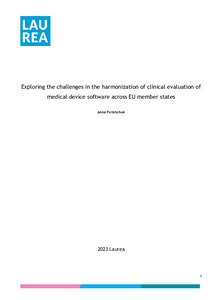Exploring the challenges in the harmonization of clinical evaluation of medical device software across EU member states
Polishchuk, Anna (2023)
Polishchuk, Anna
2023
All rights reserved. This publication is copyrighted. You may download, display and print it for Your own personal use. Commercial use is prohibited.
Julkaisun pysyvä osoite on
https://urn.fi/URN:NBN:fi:amk-2023120434178
https://urn.fi/URN:NBN:fi:amk-2023120434178
Tiivistelmä
The goal of this master's thesis was to explore the challenges of harmonization of medical device software (MDSW) clinical evaluation across EU member states, with a particular focus on proposing practical recommendations for the EU SHAPES pilot project to meet the requirements of the EU Regulations for safety, performance, and clinical benefit. The research questions focused on both exploring the challenges in the harmonization of clinical evaluation of MDSW in the EU and the potential challenges in the EU SHAPES pilot project related to clinical evaluation of the MDSW developed within the project.
The medical device industry is evolving rapidly due to the escalating importance and impact of software designed for medical purposes in enhancing healthcare outcomes. Software plays a pivotal role in diagnosing and treating various medical conditions. Consequently, it becomes imperative for both manufacturers and regulators to possess a clear understanding of when software, functioning as a medical device, must adhere to relevant regulations.
In the dynamic landscape of evolving regulatory frameworks, harmonizing clinical evaluation processes for MDSW in the EU remains challenging. The crucial role of clinical evaluation in ensuring general safety and performance requirements is highlighted by the EU Regulations, such as the Medical Devices Regulation (MDR) and the In Vitro Diagnostic Medical Devices Regulation (IVDR).
This master’s thesis was carried out within the scope of the EU SHAPES pilot project. The EU SHAPES pilot project aimed to establish a comprehensive socio-technical infrastructure encompassing healthcare digital solutions, devices, and support services. The overarching goal is to empower aging individuals by fostering engaged, autonomous, and independent living within the familiar confines of their homes.
To address the research questions, the study engaged both internal and external experts from the EU SHAPES project and the wider European MDSW ecosystem. Qualitative research methods, particularly interviews, were employed to explore non-quantifiable concepts and gather insights based on expert opinions. This master's thesis provides a comprehensive account of the impact of the MDR and IVDR on the clinical evaluation of MDSW, examining practical challenges associated with the EU regulatory framework, national implementation, variations among notified bodies, clinical investigation practices, and the utilization of real-world data (RWD).
The insights derived from the expert interviews contribute to the formulation of recommendations for the clinical evaluation process of MDSW within the SHAPES project with a special focus on thorough qualification and risk class assessments for the software to meet the requirements of MDR/IVDR for general safety and performance, as well as clinical benefit.
The medical device industry is evolving rapidly due to the escalating importance and impact of software designed for medical purposes in enhancing healthcare outcomes. Software plays a pivotal role in diagnosing and treating various medical conditions. Consequently, it becomes imperative for both manufacturers and regulators to possess a clear understanding of when software, functioning as a medical device, must adhere to relevant regulations.
In the dynamic landscape of evolving regulatory frameworks, harmonizing clinical evaluation processes for MDSW in the EU remains challenging. The crucial role of clinical evaluation in ensuring general safety and performance requirements is highlighted by the EU Regulations, such as the Medical Devices Regulation (MDR) and the In Vitro Diagnostic Medical Devices Regulation (IVDR).
This master’s thesis was carried out within the scope of the EU SHAPES pilot project. The EU SHAPES pilot project aimed to establish a comprehensive socio-technical infrastructure encompassing healthcare digital solutions, devices, and support services. The overarching goal is to empower aging individuals by fostering engaged, autonomous, and independent living within the familiar confines of their homes.
To address the research questions, the study engaged both internal and external experts from the EU SHAPES project and the wider European MDSW ecosystem. Qualitative research methods, particularly interviews, were employed to explore non-quantifiable concepts and gather insights based on expert opinions. This master's thesis provides a comprehensive account of the impact of the MDR and IVDR on the clinical evaluation of MDSW, examining practical challenges associated with the EU regulatory framework, national implementation, variations among notified bodies, clinical investigation practices, and the utilization of real-world data (RWD).
The insights derived from the expert interviews contribute to the formulation of recommendations for the clinical evaluation process of MDSW within the SHAPES project with a special focus on thorough qualification and risk class assessments for the software to meet the requirements of MDR/IVDR for general safety and performance, as well as clinical benefit.
